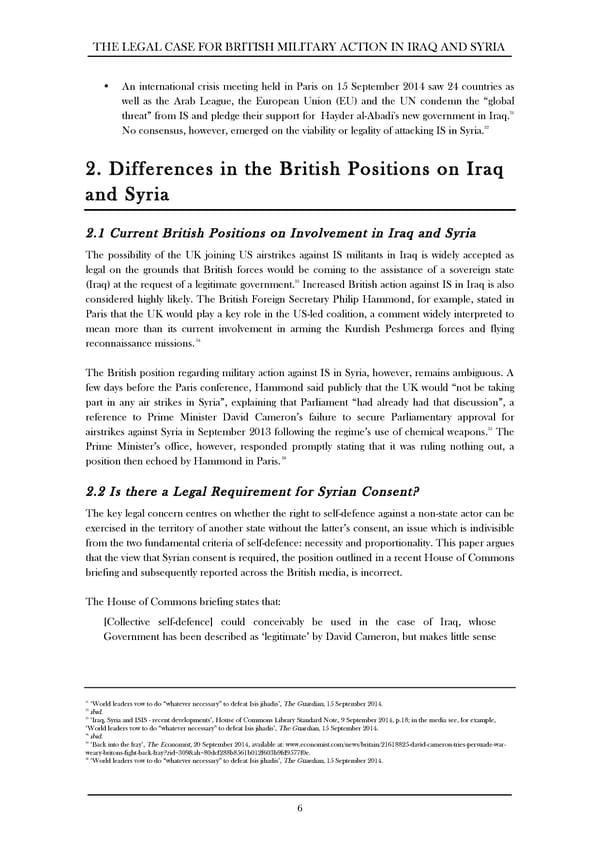THE LEGAL CASE FOR BRITISH MILITARY ACTION IN IRAQ AND SYRIA • An international crisis meeting held in Paris on 15 September 2014 saw 24 countries as well as the Arab League, the European Union (EU) and the UN condemn the “global 31 threat” from IS and pledge their support for Hayder al-Abadi's new government in Iraq. No consensus, however, emerged on the viability or legality of attacking IS in Syria.32 2. Differences in the British Positions on Iraq and Syria 2.1 Current British Positions on Involvement in Iraq and Syria The possibility of the UK joining US airstrikes against IS militants in Iraq is widely accepted as legal on the grounds that British forces would be coming to the assistance of a sovereign state 33 (Iraq) at the request of a legitimate government. Increased British action against IS in Iraq is also considered highly likely. The British Foreign Secretary Philip Hammond, for example, stated in Paris that the UK would play a key role in the US-led coalition, a comment widely interpreted to mean more than its current involvement in arming the Kurdish Peshmerga forces and flying 34 reconnaissance missions. The British position regarding military action against IS in Syria, however, remains ambiguous. A few days before the Paris conference, Hammond said publicly that the UK would “not be taking part in any air strikes in Syria”, explaining that Parliament “had already had that discussion”, a reference to Prime Minister David Cameron’s failure to secure Parliamentary approval for 35 airstrikes against Syria in September 2013 following the regime’s use of chemical weapons. The Prime Minister’s office, however, responded promptly stating that it was ruling nothing out, a 36 position then echoed by Hammond in Paris. 2.2 Is there a Legal Requirement for Syrian Consent? The key legal concern centres on whether the right to self-defence against a non-state actor can be exercised in the territory of another state without the latter’s consent, an issue which is indivisible from the two fundamental criteria of self-defence: necessity and proportionality. This paper argues that the view that Syrian consent is required, the position outlined in a recent House of Commons briefing and subsequently reported across the British media, is incorrect. The House of Commons briefing states that: [Collective self-defence] could conceivably be used in the case of Iraq, whose Government has been described as ‘legitimate’ by David Cameron, but makes little sense 31 ‘World leaders vow to do “whatever necessary” to defeat Isis jihadis’, The Guardian, 15 September 2014. 32 ibid. 33 ‘Iraq, Syria and ISIS - recent developments’, House of Commons Library Standard Note, 9 September 2014, p.18; in the media see, for example, ‘World leaders vow to do “whatever necessary” to defeat Isis jihadis’, The Guardian, 15 September 2014. 34 ibid. 35 ‘Back into the fray’, The Economist, 20 September 2014, available at: www.economist.com/news/britain/21618825-david-cameron-tries-persuade-war- weary-britons-fight-back-fray?zid=309&ah=80dcf288b8561b012f603b9fd9577f0e. 36 ‘World leaders vow to do “whatever necessary” to defeat Isis jihadis’, The Guardian, 15 September 2014. 6
 The legal case for action Page 5 Page 7
The legal case for action Page 5 Page 7